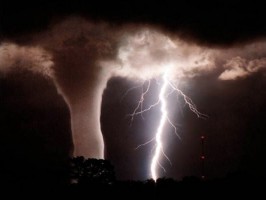 Last year, there were seven weather and climate disaster events across the United States with losses exceeding $1 billion each. These events included five severe weather and tornado events, a major flood event, and the western drought/heat wave. Overall, these events killed 109 people and had significant economic effects on the areas impacted.
Last year, there were seven weather and climate disaster events across the United States with losses exceeding $1 billion each. These events included five severe weather and tornado events, a major flood event, and the western drought/heat wave. Overall, these events killed 109 people and had significant economic effects on the areas impacted.
All of these events highlight the need for emergency preparation — highlighted by events like the National Severe Weather Preparedness Week, which runs from March 2-8, 2014.
Being prepared for severe weather hazards does not have to be complicated or expensive. A few simple steps to prepare and take action could help save lives anywhere – at home, in schools, and in the workplace before tornadoes and severe thunderstorms and extreme weather strikes.
Know your risk. Take action.
Severe weather knows no boundaries and affects every individual. Being prepared and acting quickly could be a matter of survival. The Federal Emergency Management Agency (FEMA) and Georgia Emergency Management Agency (GEMA) have the responsibility of handling Federal and State emergency events. Ready Georgia, GEMA’s statewide emergency preparedness campaign, offers tools that residents can use to create an emergency supply kit, develop a communications plan and stay informed about potential threats. Ready Georgia’s interactive website, www.ready.ga.gov, provides detailed information on Georgia-specific emergency preparedness and allows users to create a personal profile and receive a customized checklist and family communications plan.
Employers can use the Ready Your Business guide to create custom contingency plans, and children can visit the ReadyKids page for age-appropriate information, videos and games. For preparedness on the go, families can also download Ready Georgia’s free mobile app at http://www.ready.ga.gov/mobileapp to learn how to prepare for emergencies, create family communications plans and more.
Have you prepared an emergency plan for your home and your agency location? If so, is it up to date? More than half the households in the United States have no emergency plan. GEMA and FEMA offer a lot of information to help develop a plan on how to deal with emergencies.
Ready.GA.gov offers some of the following guidelines for homes:
- Supply Checklist for Severe Weather emergencies
- Do you have a stored water supply of at least 3 gallons per day per person?
- Do you have a 3 day Non-Perishable food supply for your family?
- Do you have a manual can opener, batteries, flashlights and a NOAA alert radio?
- Do you have a fully stocked First Aid kit?
- Are you prepared for a cold weather emergency if the power goes out?
- Fire & Medical emergency preparation for your location or home:
- Are there two ways out of your home or office?
- Have you established a meeting point once you have evacuated?
- Do you have a First Aid kit? Are Emergency numbers posted?
- Do you know who has First Aid training at your location?
- Flooding preparation:
- Do you know what items you want to take with you during an evacuation?
- Do you have emergency contact numbers in case roads are flooded in your area or at your location?
Of course these are the short list of items. A few minutes of preparation can save a life or make you far more comfortable in case of an emergency situation.







